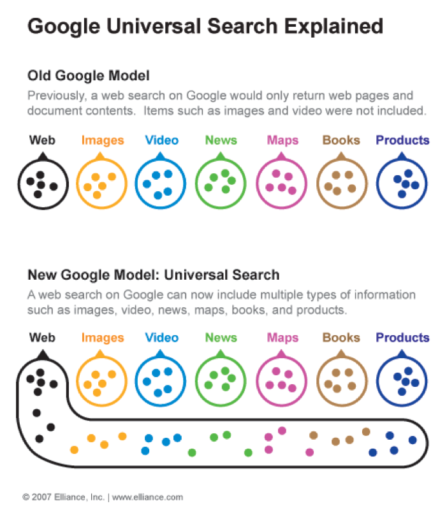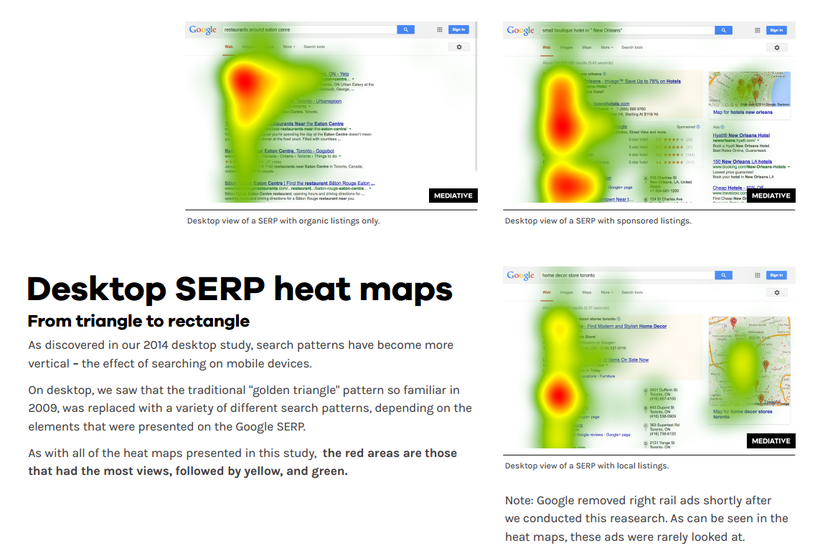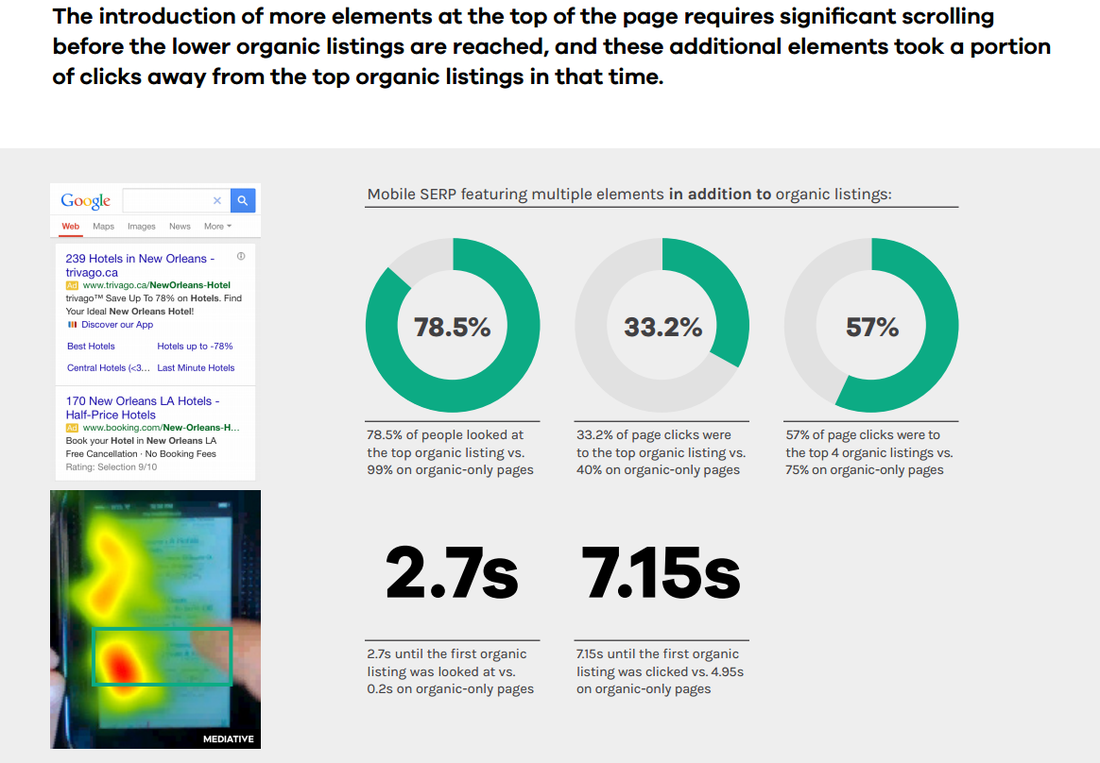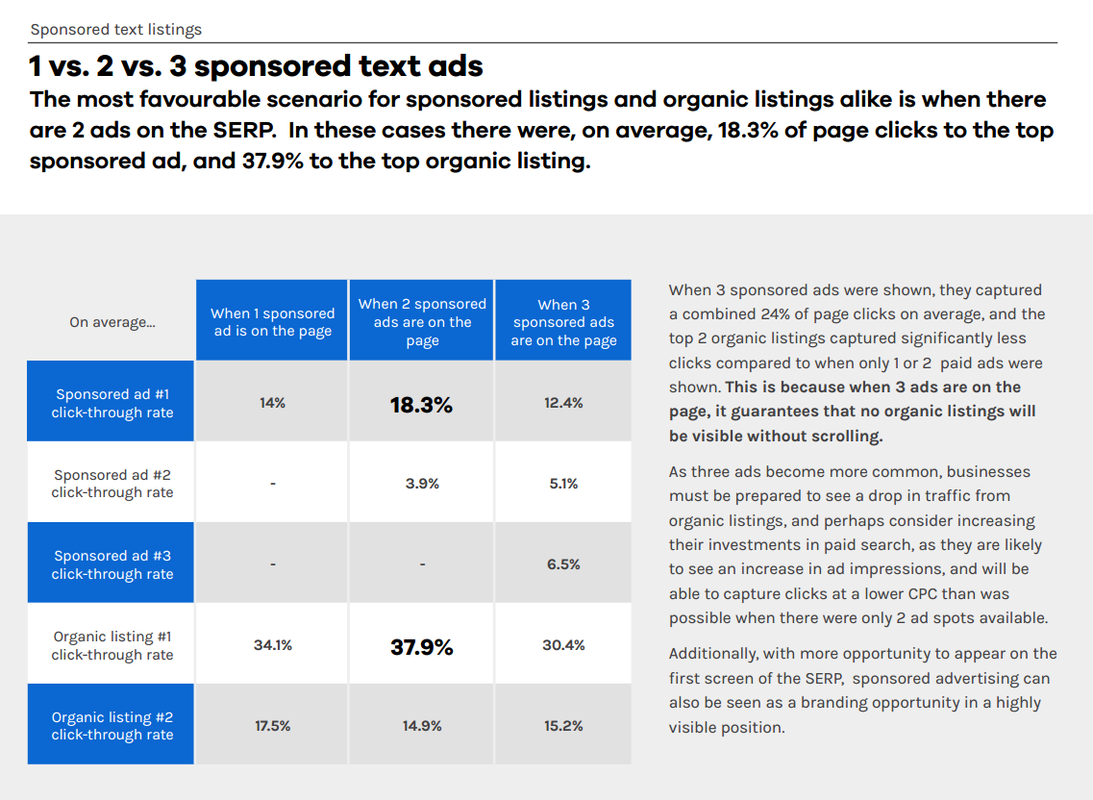|
7 min read
Stop judging your Google ranking performance by a few isolated keywords alone. No, seriously... Just stop it. If you've seen Google's search results pages recently, you may have noticed that a bit more than only 10 organic listings show on the page. It's a fact: Google is providing more information than ever on it's Search Engine Result Pages ('SERPs') such as reviews, menus, recipes and event times; the goal is to provide answers to users questions quickly and effectively. Yes, that's providing answers before users even hit your website. In 2017 and beyond it's more important than ever to take an '800 foot view' and be thinking about earning and maximising your share of space on page one of Google, rather than only focusing on one small section of the organic (or paid) text listings. * Even though we first wrote about these concepts back in 2015, this is a topic that still comes up regularly. Below is the 2017 update with new mobile and desktop heat map data hot off the press. So, What is Share of SERP?
'Share of SERP' is the share of available space on a search engine results page (or 'SERP') that can be earned by a single entity or web page through SEO and other website optimisation techniques.
Improving share of SERP is therefore about earning and maximising your share of space on page one of search engines (such as Google). Understanding 'Traditional SEO' Vs 'Share of SERP'
No, SEO is not dead, it's just changed.
Most importantly - it's not done like it was 5 or 10 years ago. The fundamental change being that Google is no longer simply about ranking web pages for keywords; it's about providing answers to peoples' questions. This is often done in the way that is of highest value (and shortest time) to the user. This means that sometimes the answer is provided directly on the SERPs. And Google is becoming smart. VERY smart. Not only does the search engine try to predict what the searcher is typing is as they type it, there has also been the introduction of more complex AI into Google search (aka 'Rankbrain'), improvements in semantic search (so that the keywords you enter aren't even what comes out the other end any more), universal search and a host of extra structured data which now appears alongside standard text results, not to even mention changes to Adwords ads.
Google is improving the data present on the SERPs, changing and growing all the time.
Below are just a few examples of how the SERP can look on any given search, complete with heat maps of where people are paying the most attention. Have any trouble noticing the organic listings? Your #1 Organic Listing Is Weak
So what's the effect of all of these changes? That there really is just so much 'extra stuff' on the page for people to click on?
According to a recent 2017 WordStream article, the value of a #1 Google Ranking is down by 37% in the last two years. Are you still clinging to those #1 organic listings you have for a handful of keywords?
The effects of this are even more prevalent on mobile devices where screen real estate is so limited.
When the SERP is stacked out with knowledge graph results and ads, it's quite a lot of scrolling that users have to do to even get to the first organic results. According to a recent Mediative study -
The findings from the study suggest: What About When More Ads Appear On The Page?
The #1 organic listing still gets most of the clicks (according to the same study), but this is greatly reduced, especially for mobile - down to around 30.4% when 3 sponsored ads appear on the page.
Comparatively, the #1 PPC Ad on mobile gets as much as 18.3% of the clicks: What Can You Do Right Now to Improve?
If you haven't already done so... it's a case of changing your thinking away from 'ranking for keywords' and more towards maximising a 'Page 1 share of voice', or 'share of SERP'.
Check out our recent blog post which gives 11 tips and quick wins for small (or large) businesses to get more opportunities to be in front of your most relevant customers when it's most relevant: In Conclusion
It's quite surprising how many businesses (and even some SEOs) have been slow to act in this area and start thinking 'Share of SERP' rather than focusing solely on ranking for keywords.
This does (for now) however, still leave opportunities and quick wins on the table for those who are proactive to do more than just the bare minimum and more importantly, can adjust their thinking towards 'Share of SERP'. Google is now more than ever about providing the most relevant information to users, understanding their intent and answering their questions. The more businesses that start following this lead will ultimately start winning the battle for Share of SERP. Other potential good side effects include improving ROI from earned online channels, along with ROI from their overall multi channel digital marketing strategies.
0 Comments
Your comment will be posted after it is approved.
Leave a Reply. |







 RSS Feed
RSS Feed
